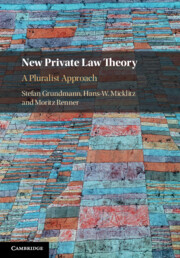Book contents
- New Private Law Theory
- New Private Law Theory
- Copyright page
- Contents
- Preface
- New Private Law Theory
- Part I Methods and Disciplines
- Part II Social Ordering, Constitutionalism and Private Law
- Part III Transactions and Risk: Private Law and the Market
- Part IV Persons and Organizations
- 18 Person, Civil Status and Private Law
- 19 Theory of the Corporation
- 20 Actors in Organizations
- 21 The Principal’s Decision
- 22 Organizations and Public Goods
- Part V Private Law (Rule-Setting) beyond the State
- Index
- References
20 - Actors in Organizations
from Part IV - Persons and Organizations
Published online by Cambridge University Press: 09 April 2021
- New Private Law Theory
- New Private Law Theory
- Copyright page
- Contents
- Preface
- New Private Law Theory
- Part I Methods and Disciplines
- Part II Social Ordering, Constitutionalism and Private Law
- Part III Transactions and Risk: Private Law and the Market
- Part IV Persons and Organizations
- 18 Person, Civil Status and Private Law
- 19 Theory of the Corporation
- 20 Actors in Organizations
- 21 The Principal’s Decision
- 22 Organizations and Public Goods
- Part V Private Law (Rule-Setting) beyond the State
- Index
- References
Summary
The chapter discusses the division of ownership and control, probably the most striking feature of large-scale economic organization in our time. This refers to the fact that the large company/corporation is owned by the totality of the shareholders, but the structure and assets ‘owned’ are managed and decided on primarily by the board of directors. Thus, ownership and decision power on the property are systematically in different hands – in law, but often also de facto. This fully applies at least to corporations with dispersed ownership, especially those listed on exchanges or alternative trading venues. Corporations of course do not only affect shareholders and managers, but at least two other groups. These are stakeholders in the more concrete sense, that is, parties that have a relatively concrete interest, typically supported by legal norms, namely contractual rights, in the corporation – labour and creditors.
- Type
- Chapter
- Information
- New Private Law TheoryA Pluralist Approach, pp. 369 - 390Publisher: Cambridge University PressPrint publication year: 2021

